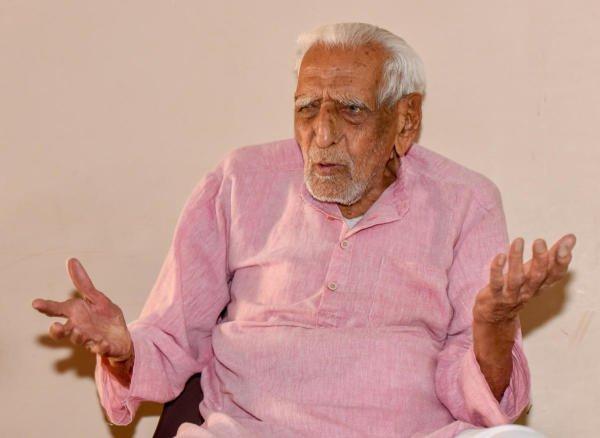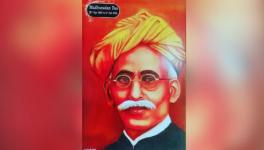Not Just Doreswamy, India’s Idea of Independence is Being Debased

“Though this be madness yet there is method in it.”
Hamlet, William Shakespeare.
The saffron brigade’s ever-readiness to stigmatise people holding differing opinions and dissenting voices reached a new low recently.
Perhaps it was the saddest day in post-independence India when a Karnataka BJP legislator hurled abuses of being a ‘Pak agent’ and ‘fake freedom-fighter at 102-year-old freedom fighter, H Doreswamy.
Sadly, not many outside the state would know that Harohalli Srinivasaiah Doreswamy, born on 10 April 1918 in the former princely state of Mysore, was first jailed in 1942 during the Quit India movement. He was associated with a group involved in making bombs and spent 14 months behind bars. After his release he continued with his mission and following Independence chose to work with slum-dwellers, the homeless and poor landless farmers, cobblers and porters. He kept himself aloof from holding political power.
In 1975, he challenged then prime minister Indira Gandhi when Emergency was declared, civil liberties were suspended and again faced jail under the draconian Defence of India Regulations Act. Despite old age, his enthusiasm for public causes remains undiminished. One issue closest to his heart remains getting the poor and the landless right to land.
Of late, he has been a prominent figure at protests against the controversial Citizenship Amendment Act (CAA) and has been openly critical of the BJP-led central government’s policies.
The BJP legislator under question is Basangouda Patil Yatnal. When the issue was raised in the Karnataka Assembly, forget issuing an unconditional apology, Yatnal remained adamant. Not just that. He got the support of many of his colleagues. It would be asking too much for the government to take action; a reprimand or case against the legislator for his comments, though they violate the Constitution which considers disrespect to freedom movement a “violation of our fundamental duties”.
For close watcher of the saffrons and their trajectory there is nothing surprising in Yatnal’s behaviour.
His denigration of a freedom fighter, in fact, resonates with Hindutva’s essential, though concealed, disdain for the anti-colonial struggle. According to them, the independence movement brought to power ‘pseudo-seculars’ and their allies, and did great harm to the cause of a Hindu nation. Numerous instances show its custodians ridiculing martyrs and their struggles or their attempts to spin an alternate narrative.
A very typical instance was how Narendra Modi, who started his life as a pracharak of the RSS, when he was newly-elected Prime Minister, replied to the motion of thanks to the President’s address at the joint session of Parliament in 2014. He said, “Barah-sau saal ki ghulami ki maansikta humein pareshan kar rahi hai. Bahut baar humse thoda uncha vyakti mile, to sar uncha karke baat karne ki humari taaqat nahin hoti hai.” [Our 1,200-year slavish mentality is troubling us. Often, when we meet a person of higher stature, we fail to muster the strength to speak up.]”
The key phrase here is “slavish mentality of 1,200 years”.
Modi offered here a new interpretation to Indian history, which was a paradigm shift from what we had learned in school. We had learned of the “slavery of 200 years”—the years of colonial rule. Now Modi had increased the time period to 1,200 years. What Modi did here was to erase the difference between the era of colonialism under the British Raj and the earlier kingdoms, many of them led by Muslim rulers. This is the RSS view that the Muslims are alien to India, that “they” ruled “us” for a thousand years.
Close on the heels of BJP’s victory in the 2014 election, Suresh Soni, a long-time RSS pracharak, created controversy with his address to 161 first-time BJP Members of Parliament at a two-day training camp organised by the party at Surajkund near Delhi. He compared the party’s electoral victory with India’s independence in 1947. “On 16 May, the day of election results, it felt the same way as it was on 16 August 1947, when the British had left India,” he reportedly said.
History bears witness to the fact that from the days of the struggle led by the legendary Tilaka Majhi (1757 AD) to the historic Quit India movement (1942) or the Royal Indian Navy strike (1946), the near-200 years of British rule in India were met with resistances that were led by a wide cross-section of society.
The first half of the 20th Century witnessed the coalescence of different anti-British forces under the Congress banner, the emergence of the Communist movement as well as the revolutionary movement led by the Bhagat Singh, Chandra Shekhar Azad, Subhash Chandra Bose and others. All of these were a serious challenge to colonial rule. The emergence of the Indian National Army under Bose is another memorable chapter of the period. All of these developments, and the growing aspirations of the Indian people to be free, could not inspire the Hindutva ideologues to push the organisations they led to join this struggle.
Anyone who has studied the independence struggle knows that it was a weak point as far as Hindutva formations in general and the RSS in particular are concerned. Much has been written about the fact that not only did the RSS not participate in the struggle, but instead focused on “organising Hindus” and deterred its members from joining the movement.
This is KB Hedgewar, the RSS’ founder, as recorded by his biographer CP Bishikar: “Patriotism is not only going to prison. It is not correct to be carried away by such superficial patriotism.”
Here is what MS Golwalkar, another RSS supremo: “There is no doubt that such men who embrace martyrdom are great heroes and their philosophy too is pre-eminently manly. They are far above the average men who meekly submit to fate and remain in fear and inaction. All the same, such persons are not held up as ideals in our society. We have not looked upon their martyrdom as the highest point of greatness to which men should aspire. For, after all, they failed in achieving their ideal, and failure implies some fatal flaw in them.”
Contrary to what they would like us to believe, there are strong commonalities between Hindu communalists and Muslim communalists. Neither the Hindu communalists led by the likes of Veer Savarkar and Golwalkar nor the group led by Mohammad Ali Jinnah participated in the Quit India movement. Their support for British rule is also evident in the fact that the Hindu Mahasabha was running coalition governments in West Bengal and parts of today’s Pakistan with the Muslim League.
While Syama Prasad Mookerjee, then the leader of the Hindu Mahasabha, was a senior minister in the Shahid Suhrawardy-led government, his party supremo Savarkar was on a whirlwind tour of the country, holding public meetings and appealing the youth to join the imperial British army with his slogan “militarise Hinduism and Hinduise [the] nation”.
In fact, the RSS played such an ignoble role during that tumultuous period that today they find it difficult to defend themselves over their inaction. To save themselves from such discomfiting questions, they either appropriate a leader from that period and show his or her proximity with the ideals of Hindutva or denigrate India’s martyrs.
One of the best spins to the Hindutva narrative has in fact come from Nirmala Sitharaman, who is at present the Finance Minister.
Her way has been to reinterpret the independence movement to suit the Hindutva agenda. Speaking in Parliament in its last term, while she defended the sealing of illegal slaughter houses in UP she underlined: “Cow protectionism was the spirit behind India’s freedom movement.”
The real import of this statement came to the fore later, when the alleged killers of Pehlu Khan, a Muslim dairy farmer from Haryana, a self-proclaimed band of cow protectors, were compared to revolutionary freedom fighters. In a viral video Kamal Didi—who heads the Rashtriya Mahila Gau Raksha Dalin—describes the accused as the “Bhagat Singhs and Chandra Shekhar Azads of today”.
This sanitisation of the image of murderers would worry any justice-loving person. It is similar to how some years ago the body of an accused in the Dadri lynching case was draped in the tricolour flag.
When murderers are draped in the tricolour and eulogised as great heroes it is no surprise that the likes of H Doreswami, the real legendary freedom fighter, is denigrated as a “Pak agent”.
No doubt this is a moment of reckoning for all the people who are concerned with the growing trivialisation and debasement of the historic struggle for liberation of the Indian people.
The author is an independent journalist. The views are personal.
Get the latest reports & analysis with people's perspective on Protests, movements & deep analytical videos, discussions of the current affairs in your Telegram app. Subscribe to NewsClick's Telegram channel & get Real-Time updates on stories, as they get published on our website.
























